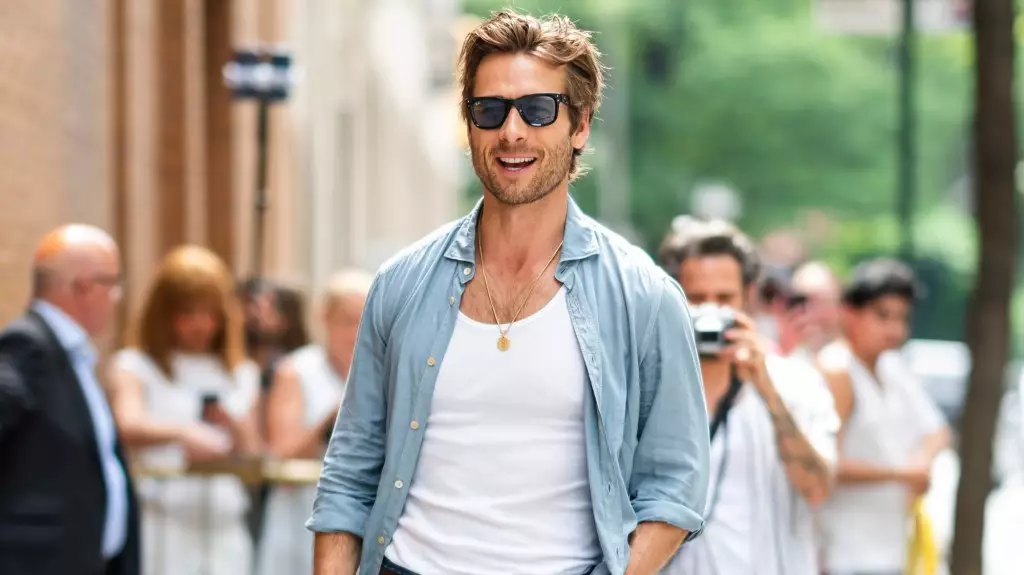In a world increasingly characterized by virtual connections and digital distractions, the recent Glen Powell lookalike contest in Austin, Texas, served as a heartening reminder of community spirit and creativity. The event, held at Auditorium Shores in Town Lake Park, attracted hundreds, uniting fans, families, and friends in a festive atmosphere. While the star of “Top Gun: Maverick” couldn’t attend in person due to filming commitments in England, his virtual presence through a FaceTime call imbued the occasion with a personal touch that resonated deeply with attendees.
What set this gathering apart from mere celebrity adoration was its heart and humor. Powell’s input was not just a scripted message; it was an illustration of his genuine engagement with fans. The actor’s playful tone and witty remarks signaled a refreshing departure from the often sterile and promotional nature of celebrity appearances. This blurring of lines between audience and star transformed the event into a shared experience, fostering camaraderie among participants, regardless of their level of resemblance to the actor.
The emergence of lookalike contests stems from a unique cultural trend that celebrates both individuality and communal identity. In a time when social media often glorifies polished personas, contests like these allow for playful self-expression, inviting participants to embrace not only their likenesses but their quirks. Attendees assumed various incarnations of Powell — from characters in his films to humorous takes on local culture, such as the “Torchy’s Tacos’ red devil mascot.”
This blending of personal identity with public figures emphasizes the joy found in self-deprecation and humor. The various renditions of Powell on display offered a commentary on societal aesthetics and celebrity culture. It provoked thoughts about the nature of celebrity and stardom, urging us to question what it means to ‘look like’ someone who has achieved fame while also celebrating the unique aspects of each contestant’s interpretation.
What made this contest particularly noteworthy was the enticing prize offered by Powell — a cameo in his next film. This was no ordinary contest reward; it blended elements of familial bonds with the allure of Hollywood. The prize’s intrinsic value lay not merely in the opportunity for fame but in genuine connection; by allowing winners to bring family members into the narrative, Powell created a bridge between the industry and personal lives.
The prize’s monetary valuation, humorously placed at $6 billion, indicated not only Powell’s light-heartedness but also his desire to create memorable moments for participants. The inclusion of a personal aspect to the win served to expand the event’s significance beyond a simple competition, creating lasting memories that would resonate with individuals long after the day concluded.
The event was not just about imitation; it highlighted the cultural richness of Austin, showcasing the city’s famed slogan of keeping things “weird.” The fun-loving nature of the contest encouraged attendees to celebrate local identities and quirks while participating in a collective experience. Max Braunstein, the contest winner, received not just accolades, but tangible rewards that included free Torchy’s queso for a year — an emblem of the local gastronomic culture.
Events like the George Powell lookalike contest become an integral part of the community fabric, promoting engagement and support among residents. Rather than just a fleeting engagement with a celebrity, the friendships formed and experiences shared solidified a sense of belonging and shared enjoyment, transcending the limits typically imposed by celebrity culture.
In essence, the Glen Powell lookalike contest was a microcosm of fandom and community. It illuminated the ways in which celebrity culture can foster connections that extend beyond the screen. The participants, through their affection for Powell, channeled their enthusiasm into creativity, humor, and local pride.
This event serves as a model for how modern interactions with fame can be more than just superficial fanfare; they can create shared narratives and joyful memories. Ultimately, the Glen Powell lookalike contest wasn’t merely an opportunity to imitate an actor; it was a celebration of community creativity, showcasing how shared interests and humor can forge deeper connections among individuals. As we continue to navigate an era of increasing detachment, events like this remind us of the potential for joy found in community, creativity, and laughter.


Leave a Reply